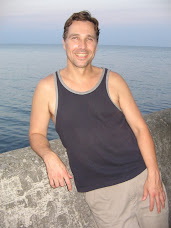As I near the end of the official first draft of Lake on the Mountain, I find myself paring down more and more. What I had thought would be three chapters turns out to be one, as I examine the material to determine what really needs to be there. This is the quest -- to bring the story down to essentials. Which doesn't mean jettisoning the writing, because the trick lies in the telling and the telling lies in the voice. In this case, 'voice' doesn't refer to a particular character, but the tone of narration. In Lake on the Mountain the voice is cynical, detached, edgy -- but not without hope.
Years ago, when I was writing my second novel, Timothy Findley volunteered to read a portion of it. His conclusion: the voice was not right. (He'd already praised my short story 'Jerry Falwell Goes To The Promised Land' as having the 'right' voice.) Of course I didn't accept his judgement and concluded the book wasn't for him. Hindsight proved him right. The book I wrote then now lies buried under a much stronger, more powerful book ... because I finally got the voice right. It was that book that taught me the necessity of having the right voice. Not just with my books, but with any book. For instance -- to choose an obvious example -- it makes a great deal of difference to have Holden Caulfield narrate the story of his decline rather than his mother or sister. So much so that we probably wouldn't want to read their version of The Catcher In The Rye -- that's how important voice can be.
January 8, 2008
Subscribe to:
Post Comments (Atom)






No comments:
Post a Comment